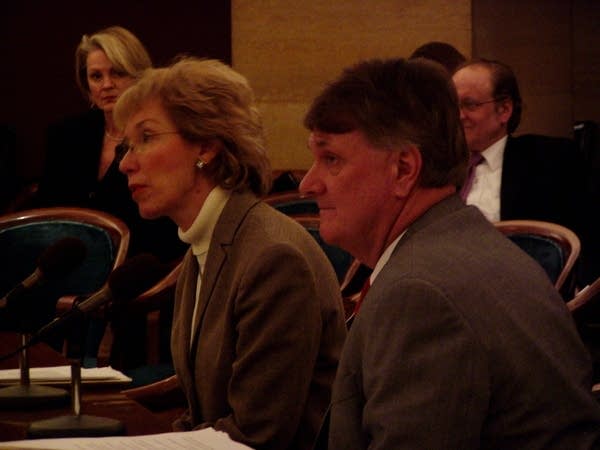No Child Left Behind at 5: Legislators say it's not working
Go Deeper.
Create an account or log in to save stories.
Like this?
Thanks for liking this story! We have added it to a list of your favorite stories.

No Child Left Behind has had a tangible impact at Anderson Open School in the Phillips neighborhood of Minneapolis. Many students are doing better on statewide tests, yet the law's one-size-fits-all approach doesn't accommodate all of the school's challenges.
Principal Mark Bonine says nearly all of the school's 750 students are low-income. Most are Hispanic or African-American, and two-thirds are learning English. Bonine's philosophy is that poverty is no excuse for not doing well in school.

On last year's statewide reading and math tests, Bonine's students met achievement goals in 17 of 18 academic areas. But because they fell short in one area: the math test scores for students learning English. Anderson Open School is on a list of schools that didn't meet the goals of No Child Left Behind.
"It is discouraging for people. And I think it's always on the back of their mind," according to Bonine, who says students and parents are happy with the school, and it even has a waiting list to get in. But he worries that could change if the school continues to fall short of student performance goals, when the penalties of No Child Left Behind kick in.
Turn Up Your Support
MPR News helps you turn down the noise and build shared understanding. Turn up your support for this public resource and keep trusted journalism accessible to all.
"If you're not making adequate yearly progress, you can be restructured, the principal can be gone, the staff could be gone, you can reconfigure," he says.
Bonine doesn't argue with the idea of measuring student progress. His school is working to improve its test scores, and he's added bilingual educators in math classes.
But Bonine says No Child Left Behind would work better if children learning English were given more time to be able to read at grade level, and if they were given a different math test with simpler language.

Minnesota Education Commissioner Alice Seagren says her department is working on an alternative math test for students learning English, and students will take the test for the first time this spring. She's also pushing the federal government to make other changes in No Child Left Behind.
Seagren says the law isn't perfect, but she's a firm believer that No Child Left Behind is closing the achievement gap.
"It is working. It is causing us to really be strategic, and it's bringing some good news to kids that may not have had as great a success as they are having now," says Seagren, adding some Minnesota schools have made significant strides in their test scores, and slowly, disadvantaged students are becoming more proficient in reading and math.
But the most recent statewide test scores don't reflect that, since the state switched to a new, tougher test. Anderson Open School was among nearly a quarter of Minnesota schools that didn't meet student achievement goals.

Critics say one of the law's biggest flaws is that it doesn't measure the progress of individual students over time.
Judy Schaubach, president of the teachers union Education Minnesota, says the law looks at how a school's third graders are doing one year, compared to an entirely different group of third graders the previous year. Minnesota has unsuccessfully sought a federal waiver to come up with a way to track the progress of individual students. Schaubach also says the expectation that 100 percent of students will be proficient in seven years is unrealistic.
"All we've done is postpone the inevitable," Schaubach says. "So there has been a lot of tweaking around the edges to buy time ... But the train wreck is still on the way."
Schaubach says Congress has never adequately funded the law's mandates, and she hopes Minnesota's congressional delegation will be able to fix and fund the law.
The state's delegation has long been skeptical of No Child Left Behind. Eighth District DFLer Jim Oberstar was the only Minnesota member of Congress to vote for the law five years ago. And one of the delegation's new members has been one of the most vocal critics of the law. Sixth District Republican Michele Bachmann pushed for Minnesota to opt out of the law's requirements when she served in the state Legislature.
"My goal is, as much as possible, take the federal government out of the equation," Bachmann says. "Let Minnesota schools do what they do so well, and that is teach our kids. We know that."
Bachmann is a strong advocate of local control, and says she'll continue to argue for repealing No Child Left Behind. While many critics agree with Bachmann, they say the law has enough political support in Washington that it seems certain to be reauthorized.





